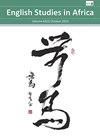Paying Homage to Virginia Woolf’s Mrs Dalloway: Revision and Reversion in Fiona Melrose’s Johannesburg
IF 0.5
4区 文学
0 LITERATURE
引用次数: 0
Abstract
This article examines Fiona Melrose’s Johannesburg (2017), a novel which pays homage to Virginia Woolf’s canonical work of literary modernism, Mrs Dalloway (1925). Yet the Johannesburg of Melrose’s novel is devoid of the transforming cosmopolitanism that characterizes Woolf’s London and which allows for new social relations to be imagined across historically entrenched boundaries. While the implicit comparison between Woolf’s post-war London and post-apartheid Johannesburg finds the latter considerably wanting, Melrose’s novel also reminds us of the limits of Woolf’s fictional imagination, which are, perhaps, most overtly marked by her representation of the servant class. I argue that Johannesburg engages, at one level, in an act of extended literary redress by privileging the perspectives of domestic workers in Johannesburg who continue, after apartheid, to labour in homes and for families that are not their own. At the same time, however, the novel maintains its appeal to a ‘postimperial’ metropolitan gaze by adopting white characters unable to extract themselves from a range of reactive phobias about Johannesburg. The novel, I conclude, thus finds itself caught between the contradictory impulses of revision and reversion; between redressing the representational conventions which entrench historical inequalities and regressing into the tropes which perpetuate our difference and separation.向弗吉尼亚·伍尔夫的《达洛维夫人》致敬:菲奥娜·梅尔罗斯的《约翰内斯堡》中的修正与回归
本文考察了菲奥娜·梅尔罗斯的《约翰内斯堡》(2017),这部小说向弗吉尼亚·伍尔夫的经典文学现代主义作品《达洛维夫人》(1925)致敬。然而,梅尔罗斯小说中的约翰内斯堡缺乏伍尔夫笔下的伦敦所特有的那种不断变化的世界主义,这种世界主义允许人们在历史上根深蒂固的界限之外想象新的社会关系。虽然将伍尔夫战后的伦敦与后种族隔离时代的约翰内斯堡进行含蓄的比较,发现后者相当欠缺,但梅尔罗斯的小说也提醒我们,伍尔夫虚构想象力的局限性,也许最明显的标志是她对仆人阶级的描绘。我认为,在某种程度上,约翰内斯堡通过赋予约翰内斯堡家政工人的观点以特权,参与了一种扩展的文学补救行为。在种族隔离之后,这些家政工人继续在家中或为非自己的家庭劳动。然而,与此同时,小说通过采用无法摆脱对约翰内斯堡的一系列反应性恐惧症的白人角色,保持了对“后时代”大都市目光的吸引力。因此,我总结说,小说发现自己陷入了修正与回归的矛盾冲动之中;在纠正巩固历史不平等的代表性惯例和回归到使我们的差异和分离永久化的比喻之间。
本文章由计算机程序翻译,如有差异,请以英文原文为准。
求助全文
约1分钟内获得全文
求助全文

 求助内容:
求助内容: 应助结果提醒方式:
应助结果提醒方式:


